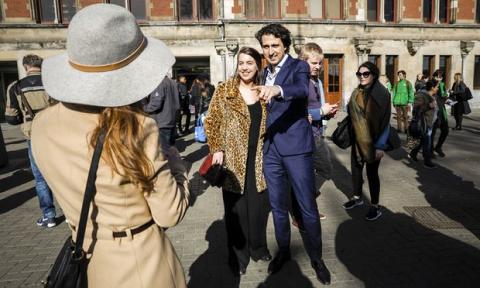The big winner of Wednesday’s election – and now the largest party of the Dutch left for the first time – was GreenLeft, headed by 30-year-old Jesse Klaver, hailed by his enthusiastic supporters as the “Jessiah”.
According to a generally reliable Ipsos exit poll, the party – formed 25 years ago by a merger of communists, pacifists, evangelicals and self-styled radicals – quadrupled its MPs from four to 16 after a storming campaign by Klaver.
“This is a fantastic result for us, a historic victory,” said the party chairwoman, Marjolein Meijer.
The result showed there was “very fertile ground in the Netherlands for change and a positive and hopeful story”, she said. “For us this is just the beginning.”
The party celebrated its historic advance with a tweet showing a gif of Kermit the Frog dancing for joy.
Sometimes compared to Canada’s youthful prime minister, Justin Trudeau, Klaver – who has a Moroccan father and a mother of Indonesian descent – said on polling day that the left’s answer to the far right’s rise in Europe was to stand up for its ideals.
“What I would say to all my leftwing friends in Europe: don’t try to fake the populace,” he said.
“Stand for your principles. Be straight. Be pro-refugee. Be pro-European. We’re gaining momentum in the polls. And I think that’s the message we have to send to Europe. You can stop populism.”
The Netherlands’ youngest ever party leader, Klaver built a strong following on social media through small Meetup events after taking over GreenLeft’s leadership in May 2015.
His rallies were among the campaign’s largest, including an Amsterdam meeting that drew more than 5,000 people – plus 5,000 more following live on Facebook.
His TV debates were also widely regarded as triumphs. In one debate watched by 1.6 million viewers, Klaver told his far-right, anti-Islam rival Geert Wilders that it was rightwing populism, not Muslim immigration, that was undermining Dutch culture and traditions.
“The values the Netherlands stands for – for many, many decades, centuries actually – its freedom, its tolerance, its empathy … [the populists] are destroying it,” he said during one campaign interview.
“It’s terrible when people are born in the Netherlands have the feeling they are not part of this society and it is not something to be proud of, but something to be ashamed of. And I want to change that.”
GreenLeft was not the only non-mainstream party to prosper in an election that featured a record 28 parties.
Also faring well were: the Party for the Animals, which is forecast to have five MPs in the 150-seat parliament; Denk, aimed mainly at the Turkish and Moroccan community, which is in line for three seats; and the Eurosceptic Forum for Democracy, with two.


Spread the word